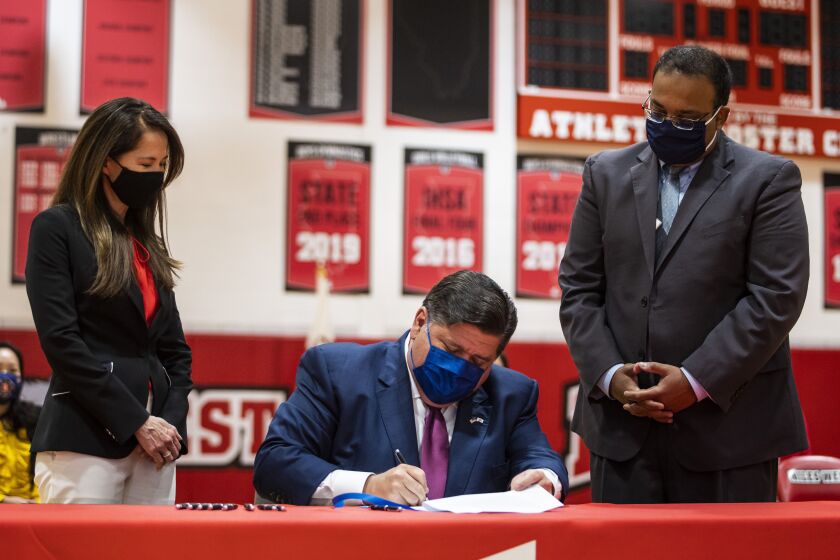
The Teaching Equitable Asian American Community History (TEAACH) Act was signed into law in April of 2021, amending Illinois School Code and mandating the teaching of a unit of Asian-American history in public elementary and high schools starting in the 2022-2023 school year. SAAPRI not only submitted testimony to support the adoption of the TEAACH Act but also advocated for an amendment that was introduced and negotiated by State Senator Ram Villivalam in the legislature. SAAPRI’s vigilance and engagement with the Illinois legislature has ensured South Asian Americans are represented and have the opportunity to weigh in on legislation affecting their communities, dating back to the early-2000s.
In January 2003, SAAPRI, as a member of the Asian American Coalition for Education (AACE), requested State Senator Barack Obama to amend the Illinois statutes and enforce that every public elementary and high school include in its curriculum a unit of instruction studying the events of the history of Asian American history in the United States. AACE and the Asian American Advisory Council of the Chicago Public Schools not only wanted to include the contributions made by individual Asian Pacific Americans in government, the arts, sciences, education, and in the economic, cultural, and political development of the United States but also include a study of their struggles as each Asian ethnic group sought to overcome barriers of discrimination and to be treated equally in our society. This request was drafted and subsequently introduced by Senator Obama as Illinois State Bill 890 and subsequently became Public Act 93-0406, which modified section 5 of the Illinois State Board of Education (ISBE) code to add Asian American.
SAAPRI’s work hasn’t stopped there – In late 2005, SAAPRI began collecting the oral histories of South Asians who came to Illinois between 1945 and 1965. This was the first attempt by any group to document the history of South Asian immigration to Illinois in the pre-civil rights era and explore how they were affected by issues of race, gender, and homeland politics. The project attempted to understand the challenges faced by this generation of South Asian immigrants, both in the immediate context of their arrival in Illinois and the broader context of world history. It examined the circumstances of their migration, their patterns of settlement, the facilitating agents and supporting institutions, and the structural and cultural barriers to advancement. The project brought together a pioneering group of immigrants whose voices might have been lost to history if not for this effort. Another special feature of this project was that the interviews were conducted and/or transcribed by university students or family members of the younger generation.
In 2007, SAAPRI began the second phase of this project, using the same methodology. This time, the oral histories were expanded to include interviewees from downstate Illinois and beyond the Chicago metro area. Through community forums and dialogues, SAAPRI created and distributed a publication that provides a pictorial and narrative history of the South Asian immigrant experience.
In 2009, SAAPRI celebrated the culmination of this project with the Memories and Milestones exhibit, an exhibit dedicated to recording, documenting and preserving our immigrants’ momentous journeys.
- Access the SAAPRI report webpage here
- Read an Executive Summary of how the oral histories were collected here
- Read the Full Our Immigrant Story Report here
- Access the Oral History project Instruction Guide here (for instructors/teachers)
Educators implementing the TEAACH Act will be able to utilize SAAPRI’s Oral History project as it discusses the immigrant experience prior to 1965; the project helps fill a gap in old history books and will prove to be an essential primary source across Illinois and the nation.
Julie Thomas Achettu, Educator in Illinois
Today, SAAPRI is a Committee member of the Pan Asian Voter Engagement (PAVE) Coalition and has joined the Curricular Resource Development working group of the TEAACH Coalition that is creating a guidance document for the ISBE that explains how current Illinois learning standards can be met through the TEAACH Act as well as compile resources to support curriculum development and lesson planning for educators.Grassroots advocacy campaigns are not built overnight and the success of the TEAACH Act, HB0376 is a testament to the history of community-led effort by members of AACE and the Asian American Advisory Committee, who raised a similar issue in the early 2000s. What was achieved in 2003 was historic and inclusive and what we were able to accomplish in 2021 under the leadership of State Senator Ram Villivalam, the first Asian American and the first South Asian American elected to the Illinois Senate, is even more groundbreaking and historic.
